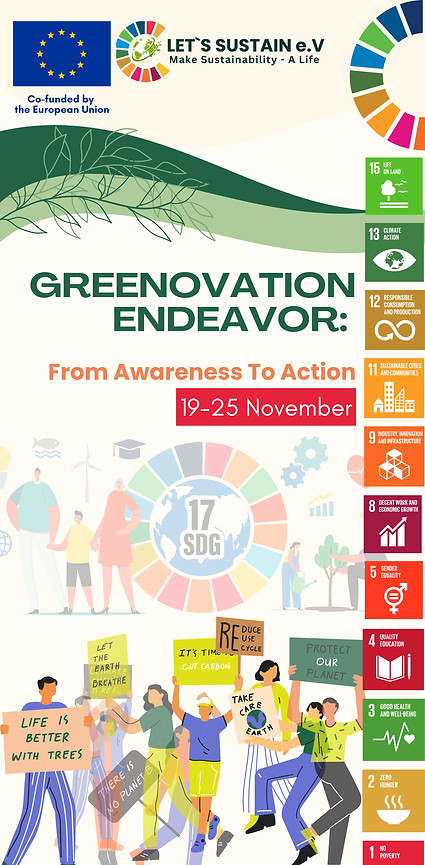

Project.
Greenovation Endeavor:
From Awareness To Action.
Climate change has been one of the greatest serious issues since the 1980s. Summers have become more intense and drier, while winters have become colder, resulting in uneven global precipitation trends. The frequency of heavy rains and other severe weather conditions like hurricanes and snow slides has increased significantly. Additionally, problems such as increasing sea levels and ocean acidification have become more common. These variations have had a negative impact on industries that rely largely on climate conditions, such as agriculture, tourism, and energy.
Moreover, countries' rapid development, especially during the twentieth century and after World War II, has increased consumption of energy and raw materials, mainly fossil fuels such as coal and oil. The sudden increase has intensified the preliminary effects of climate change, resulting in temperature variations and irregular precipitation. Similar harsh circumstances have increased the likelihood and intensity of climate-related natural disasters like droughts, floods, and storms, which caused significant economic losses. Furthermore, the concerns such as air and water pollution, and biodiversity loss require immediate response.
In contrast, Europe's population is rapidly urbanizing, emphasizing the importance of urban development policies. The decisions we choose today about the growth and sustainability of neighborhoods will have a long-term impact on future generations. As a result, there is an essential need to eliminate traditional methods and take preventive action to maintain the resiliency, sustainability, and livability of our cities and towns. Given the project's primary purpose of raising awareness about sustainability, engaging young people, and empowering them to action for a more sustainable future, by focusing primarily on the participants and their surrounding communities.
The main objectives of the Greenovation project are:
1: Draw more attention to the impacts and reasons of climate change and global warming.
2: Encourage young people to take care of and preserve the environment for coming generations by instilling in them a sense of environmental stewardship and responsibility.
3: To assess our actions and routines by calculating carbon footprints, potential threats in the future, and strategies for altering the individual’s actions for the sake of environmental and global sustainability.
4: To raise awareness and understanding about the Sustainable Development Goals (SDGs), their relevance, and the importance of sustainable and smart cities among youth and inspire young people to take action in their own communities.
5: To equip youth with knowledge and skills, they need to incorporate sustainable practices into their daily life.
6: To encourage young people to use critical thinking abilities to assess environmental problems, comprehend their effects, and consider creative solutions.
7: Motivate youth to take individual and group action in the direction of creating a more resilient and sustainable future.
8: To provide youth with the opportunity to develop their own ideas/projects related to sustainable development, and receive mentoring and support to help them implement their ideas.
9: To provide opportunities for youth to connect and collaborate with each other, as well as with local experts and organizations working in the field of sustainable development.
10: To promote intercultural understanding and collaboration among youth from different countries and backgrounds and to provide opportunities for them to reflect on their own practices and learn from each other's experiences.
11: to give young people the tools they need to assume leadership roles and promote long-lasting change both inside and outside of their communities.
12: To empower young people to be active change agents in their communities by giving them the knowledge, skills, and tools they need to effectively address environmental issues.
13. Finally, the project seeks to empower young people to have a good impact on the environment and society, helping to build a more sustainable and resilient future for themselves and future generations.
Overall, the project aims to contribute to the improvement of quality, innovation, and recognition in youth work practices.
